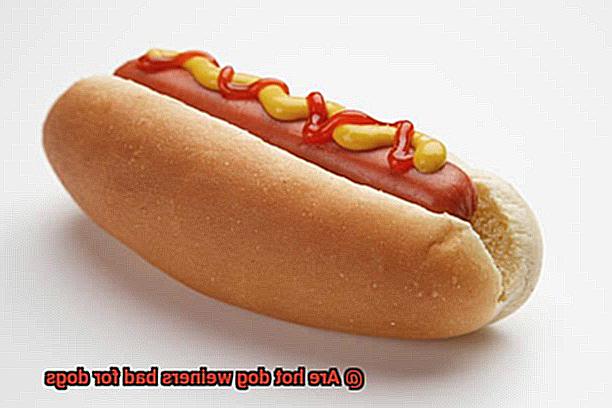Are hot dog weiners bad for dogs?
The quintessential symbol of summer, backyard cookouts, and pure indulgence. But as you reach for that juicy weiner, have you ever stopped to ponder if it’s a safe choice for your furry friend? Spoiler alert: it’s not.
Now, I get it. We all want to spoil our pups with a taste of our own guilty pleasures. But let me tell you, those innocent-looking hot dog weiners are far from innocent when it comes to your dog’s health.
Picture this: high levels of sodium, preservatives galore, and a whole bunch of questionable additives. It’s like a recipe for disaster in your pup’s tummy. These processed delights can lead to a smorgasbord of problems – obesity, heart issues, and digestive mayhem included.
But hey, I’m not here to rain on your parade completely. I understand the appeal of sharing a special moment with your fur baby over a shared love for hot dogs. And truth be told, as an occasional indulgence or treat in moderation, hot dogs won’t send your pooch into a tailspin (pun intended).
However (and this is crucial), we must prioritize our four-legged friends’ overall well-being by making sure their main diet consists of nutritionally balanced meals. Think of hot dogs as the cherry on top – delicious but not essential.
In this blog post, we’re diving deep into the sizzling debate over whether hot dogs should make an appearance in your dog’s bowl. We’ll explore the risks they pose to their health and uncover some alternative treat options that will keep both you and Fido wagging with joy.
So grab yourself a cold lemonade (or maybe even a veggie dog) and join us on this journey through the world of hot dogs and dogs – where temptation meets health, and we all learn to make the best choices for our beloved companions.
What Makes Hot Dog Weiners Unhealthy for Dogs?
Contents
- 1 What Makes Hot Dog Weiners Unhealthy for Dogs?
- 2 The Dangers of Excessive Sodium Intake in Dogs
- 3 Potential Health Risks From Preservatives in Hot Dog Weiners
- 4 Allergens and Artificial Flavors in Hot Dog Weiners
- 5 Nutritional Requirements of French Bulldogs
- 6 Healthy Alternatives to Hot Dog Weiners for French Bulldogs
- 7 Reading Labels and Choosing Treats for Your French Bulldog
- 8 Consulting with a Veterinarian About Your French Bulldog’s Diet
- 9 Conclusion
French Bulldogs are adorable and beloved companions, known for their playful personalities and distinctive bat-like ears. As a responsible French Bulldog owner, it’s crucial to provide them with a healthy diet that meets their unique nutritional needs. In this blog post, we will explore why hot dog weiners are unhealthy for dogs, focusing specifically on our precious French Bulldogs.
The Sodium Surprise:
Have you ever noticed how salty hot dog weiners taste? Well, that high sodium content can spell trouble for our furry friends. Dogs have lower tolerance for salt compared to humans, making them more susceptible to dehydration, high blood pressure, and kidney problems. Since French Bulldogs are prone to heat exhaustion and dehydration due to their brachycephalic nature, it’s even more important to avoid feeding them hot dog weiners.
The Fat Fiasco:
Hot dog weiners often contain low-quality cuts of meat or even meat by-products, which means they are loaded with unhealthy fats. High-fat diets can lead to obesity in dogs and even contribute to the development of pancreatitis – a painful inflammation of the pancreas. This condition is especially concerning for French Bulldogs, who are already predisposed to certain health issues.
Additives and Preservatives:
Hot dog weiners are notorious for containing additives and preservatives like nitrates and nitrites. While these chemicals enhance flavor and preserve freshness, they have been linked to an increased risk of certain cancers in dogs, including bladder cancer. As responsible French Bulldog owners, we want to minimize any potential risks to our precious companions.
Toxic Ingredients:
Onions and garlic are commonly used in hot dog weiners as flavor enhancers. However, these vegetables contain compounds that can damage a dog’s red blood cells, leading to anemia or other serious health complications. It’s important to note that even small amounts of onion or garlic can be toxic to dogs.
Choking Hazards:
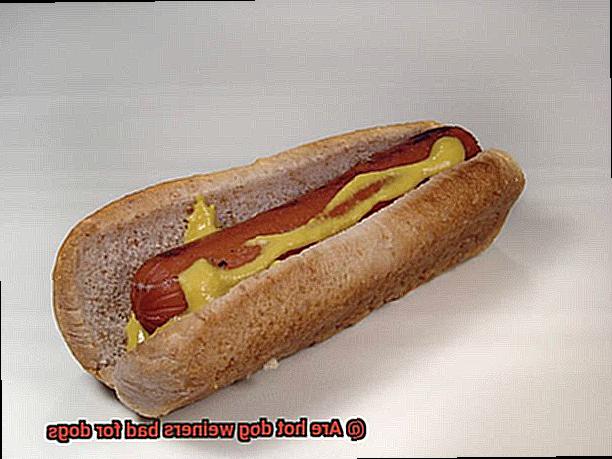
The size and shape of hot dog weiners can pose a choking hazard to dogs, especially those with shorter snouts like French Bulldogs. Their cylindrical shape and smooth texture make them easy for dogs to swallow whole, increasing the risk of choking or blockage in the digestive tract.
Beware of Buns and Condiments:
Hot dog weiners are often served on buns or with condiments that are not suitable for dogs. Buns may contain ingredients like onions or garlic, while condiments like ketchup or mustard can contain additives and high levels of sugar or sodium. These additions can cause digestive issues or other health problems for our French Bulldogs.
The Dangers of Excessive Sodium Intake in Dogs
As French Bulldog owners, we all want what’s best for our furry friends. We shower them with love, provide them with the best care, and make sure they have a healthy diet. But did you know that something as innocent as a hot dog weiner can pose a serious danger to your French Bulldog’s health? That’s right, excessive sodium intake can have detrimental effects on our beloved companions. Let’s dive into the dangers and what we can do to keep our Frenchies safe.
Why is sodium dangerous for dogs?
Sodium is an essential mineral that helps maintain fluid balance and aids in nerve function. However, dogs have a much lower tolerance for sodium compared to humans. When dogs consume too much sodium, it can lead to various health problems.
Dehydration and kidney damage
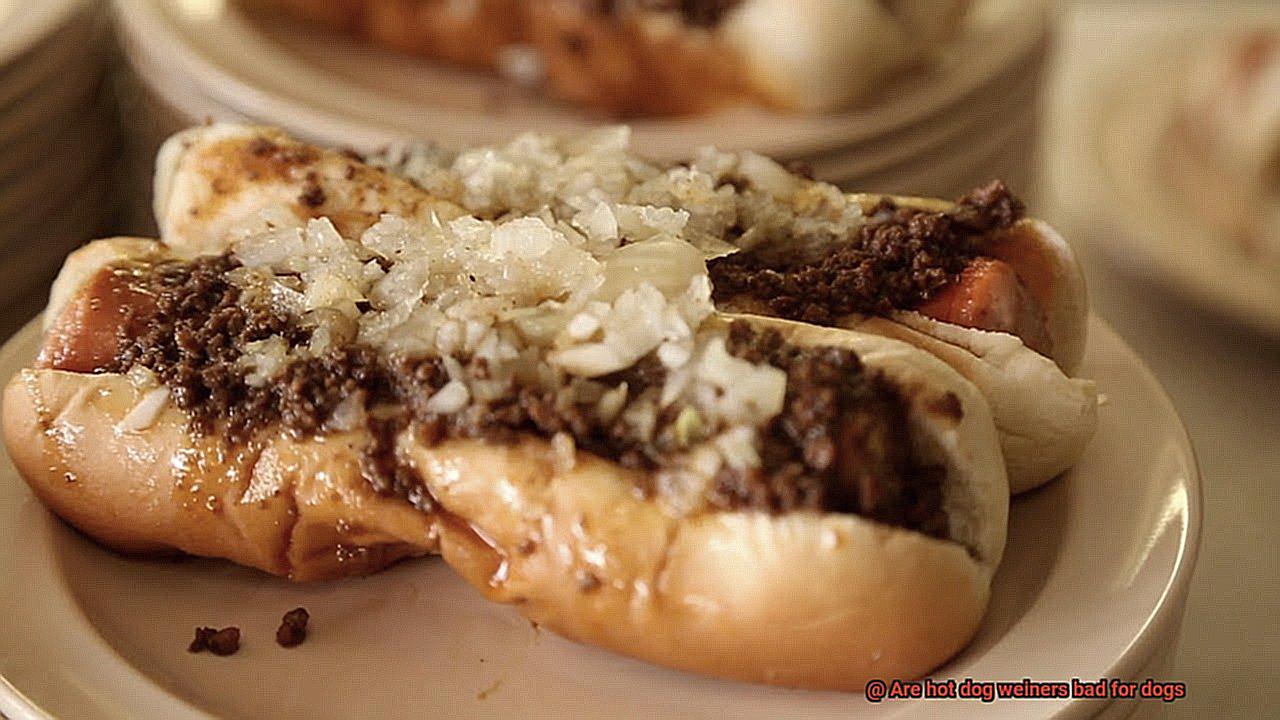
Excessive sodium intake can cause dehydration in dogs. Sodium draws water from the body into the bloodstream, putting strain on the kidneys. For French Bulldogs with pre-existing kidney issues, this can be especially dangerous, as their kidneys may already be compromised.
Cardiovascular problems
High sodium levels can also lead to an increase in blood pressure, which can result in cardiovascular problems like heart disease or stroke. Our Frenchies’ hearts are already at risk due to their brachycephalic (flat-faced) nature, so it’s crucial to avoid adding additional stress to their cardiovascular system.
Electrolyte imbalances
Sodium works in conjunction with other electrolytes like potassium and chloride. Excessive sodium intake can disrupt the balance of these electrolytes in the body, leading to further complications and disrupting normal bodily functions.
Recognizing the symptoms
It’s important to be aware of the symptoms of excessive sodium intake in French Bulldogs. Keep an eye out for increased thirst and urination, vomiting, diarrhea, lethargy, tremors, seizures, and even coma or death in severe cases. If you notice any of these signs, seek veterinary attention immediately.
Prevention is key
The best way to prevent excessive sodium intake in French Bulldogs is to avoid feeding them hot dog weiners or other high-sodium processed meats. Instead, opt for healthier alternatives like lean proteins such as chicken or turkey. Remember, occasional consumption of small amounts of hot dog weiners may not immediately harm your Frenchie, but repeated or regular feeding can lead to cumulative effects over time.
Consult your veterinarian
Every French Bulldog is unique, and their dietary needs may vary. It’s always a good idea to consult with your veterinarian for specific dietary recommendations for your Frenchie, especially if they have pre-existing health conditions or are prone to kidney or heart issues.
Potential Health Risks From Preservatives in Hot Dog Weiners
Picture this: it’s a sunny summer day, and you’re enjoying a backyard barbecue with your beloved French Bulldog by your side. The aroma of sizzling hot dog weiners fills the air, tempting you to indulge in this classic American treat. But before you take that first bite, let’s talk about the potential health risks associated with the preservatives lurking in those tasty wieners.
Preservatives like sodium nitrite and sodium erythorbate are commonly used in hot dog weiners to prolong their shelf life and enhance their color. These additives may seem harmless at first glance, but don’t be fooled – they can pose serious risks to both you and your furry friend.
- Carcinogenic Compounds: Sodium nitrite, while effective in preventing bacterial growth, can also form nitrosamines – compounds that have been linked to an increased risk of cancer. Studies have shown that consuming foods high in nitrites, such as hot dog weiners, can elevate the chances of developing colorectal, stomach, and pancreatic cancers. It’s like playing a dangerous game of Russian roulette with your health.
- Allergic Reactions and Adverse Effects: Sodium erythorbate, another common preservative found in hot dog weiners, is generally considered safe for consumption. However, some individuals may experience allergic reactions or other adverse effects. Your Frenchie may not be able to express their discomfort in words, but their well-being should always be our top priority.
- Artificial Flavors with a Price: Those tantalizing artificial flavors that make hot dog weiners so addictive might be doing more harm than good. Derived from chemicals, these flavors can have negative effects on the body when consumed excessively. Some individuals may even be sensitive or allergic to certain artificial flavors, leading to unwanted symptoms. Your Frenchie’s health is too precious to put at risk.
The dangers of hot dog weiners don’t end with preservatives alone. The high sodium content in processed meats can contribute to health issues such as high blood pressure and an increased risk of heart disease. And let’s not forget about the high fat content, which can lead to weight gain and obesity – conditions that are associated with diabetes and cardiovascular problems. It’s like opening Pandora’s box of health risks.
So, what can you do to protect your Frenchie’s health? Here are some paw-some tips:
Moderation is Key: While the occasional indulgence in a hot dog wiener may not have significant health consequences, regular and excessive consumption can increase the risk of developing chronic health conditions over time. Treat hot dog weiners like an occasional guilty pleasure – enjoy them sparingly.
Allergens and Artificial Flavors in Hot Dog Weiners
We all know how much we love our furry little friends and want the best for them. That’s why it’s important to be aware of the potential risks that come with feeding hot dog weiners to our Frenchies. So, let’s dig into this topic and make sure our four-legged companions stay happy and healthy.
Artificial Flavors: A Recipe for Trouble
Hot dog weiners are notorious for containing artificial flavors and additives. These chemical compounds are used to enhance the taste of food but provide no nutritional value. For dogs with food allergies or sensitivities, these artificial flavors can spell trouble.
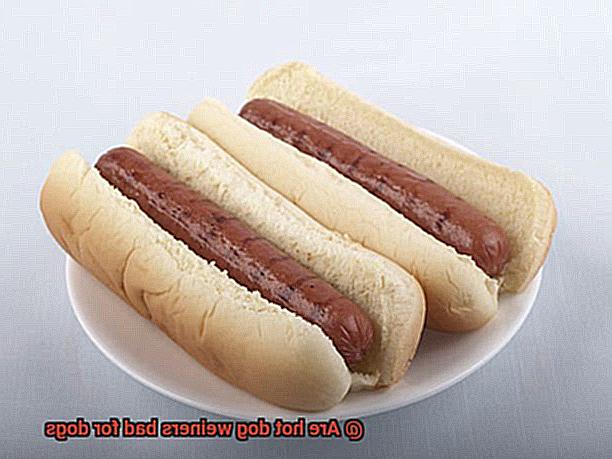
Some common artificial flavors found in hot dog weiners include monosodium glutamate (MSG) and artificial smoke flavor. These can cause allergic reactions in certain dogs, leading to itching, upset stomachs, or even respiratory problems.
Not the kind of treat we want to give our precious Frenchies.
Allergens: Triggers for Trouble
But wait, there’s more. Hot dog weiners can also contain allergens like wheat, soy, or dairy. These ingredients can trigger allergic reactions in dogs with specific food sensitivities. If your Frenchie has a sensitive tummy or itchy skin, it’s important to read those ingredient labels carefully before giving them any hot dog weiners.
Look for products that are free from artificial flavors and allergens that your dog may be sensitive to. Your Frenchie will thank you.
A Healthy Alternative: Treats Made with Love
Instead of relying on hot dog weiners as a go-to treat for your furry friend, consider healthier options that will keep them wagging their tails. Try giving them small pieces of cooked lean meats like chicken or turkey.
Not only are these treats tasty, but they’re also packed with protein that will keep your Frenchie feeling strong and energized. Vegetables like carrots or green beans can also make for a crunchy and nutritious snack.
Take It Easy: Moderation is Key
Now, I know what you’re thinking – “Can I ever give my Frenchie a hot dog wiener?” Well, the answer is yes, but in moderation. While an occasional small piece may not cause harm, it’s best to avoid feeding hot dog weiners to your French bulldog on a regular basis.
These tempting treats are often high in sodium and unhealthy additives, which can be detrimental to your Frenchie’s overall health if consumed regularly.
So, save the hot dogs for those special occasions and opt for healthier options in your day-to-day treat routine.
Nutritional Requirements of French Bulldogs
Today, I want to talk about something near and dear to your heart (and your pup’s tummy) – their nutritional requirements. You see, just like us humans, French Bulldogs have specific needs when it comes to their diet. And let me tell you, hot dog weiners are definitely not on the menu.
Protein Power: Building Blocks for Bully Muscles
First things first, let’s talk protein. Protein is like the superhero of nutrients for our furry friends. It helps with muscle development, repair, and growth. And trust me, your French Bulldog needs all the muscle power they can get to keep up with their playful and energetic nature.
Lean meats like chicken, turkey, and fish are excellent sources of high-quality protein that should be a staple in their diet. But hold the phone. Hot dog weiners? Not so much. They often contain additives, preservatives, and high levels of sodium that can wreak havoc on your pup’s health.
Fat Facts: Keeping Your Frenchie Fit and Fabulous
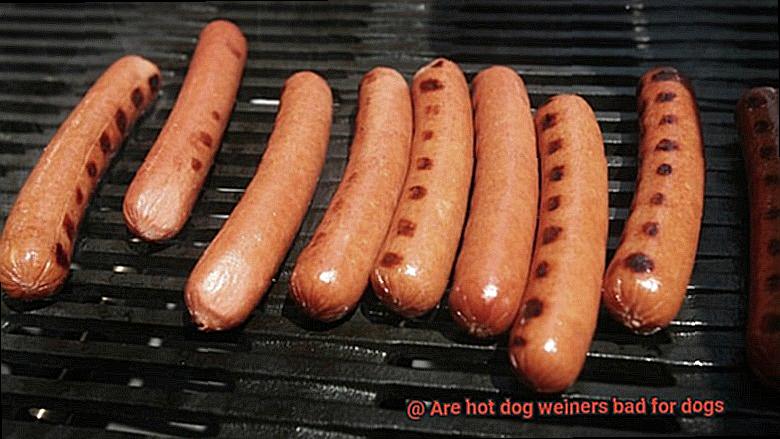
Now, let’s dive into the world of fats. Yes, fats are important too. They provide energy and help absorb those fat-soluble vitamins that keep your pooch in tip-top shape. But here’s the catch – not all fats are created equal.
Healthy fats, like those found in fish oil or coconut oil, are what your French Bulldog needs. These fats help maintain a healthy weight and give them that shiny coat you can’t stop raving about. On the flip side, hot dog weiners are usually loaded with unhealthy fats that can lead to weight gain and obesity if consumed regularly. Nobody wants a chunky Frenchie.
Carb Confusion: Choosing the Right Kind
Ah, carbohydrates – the fuel for our beloved Frenchies. But let’s be clear – not all carbs are created equal either. Complex carbohydrates, like whole grains and vegetables, are the way to go. They provide fiber for digestion and help regulate blood sugar levels.
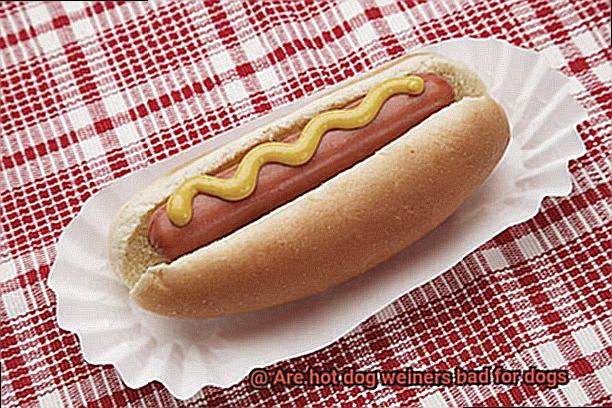
Simple carbohydrates found in processed foods like hot dog buns? Not so much. These can cause spikes in blood sugar and leave your Frenchie feeling sluggish and not their usual energetic self. So, let’s keep those hot dog buns for our human BBQs, shall we?
Vitamins and Minerals: The Secret Sauce to a Healthy Frenchie
Last but not least, we have vitamins and minerals. These little powerhouses are essential for your French Bulldog’s immune system and overall vitality. And guess what? Hot dog weiners won’t do the trick here either.
Healthy Alternatives to Hot Dog Weiners for French Bulldogs
French Bulldogs are beloved companions known for their unique personalities and adorable looks. As responsible pet owners, it’s our duty to provide them with a balanced diet that supports their overall health and well-being.
While hot dog weiners may seem like a quick and easy treat, they are not an ideal choice for French Bulldogs due to their high sodium, preservatives, and artificial ingredients. In this blog post, we will explore some healthier alternatives that will keep your furry friend happy and healthy.
Lean Meats:
Instead of hot dog weiners, consider offering lean meats such as chicken or turkey as a substitute. These meats should be cooked thoroughly without any seasonings or additives that may be harmful to dogs. Lean meats provide essential proteins that support muscle growth and maintenance in French Bulldogs.
Fresh Fruits and Vegetables:
Another option for healthy treats is fresh fruits and vegetables. Not only do they offer a variety of nutrients, but they also serve as a low-calorie alternative to hot dog weiners. Sliced apples, carrots, green beans, and blueberries are all excellent choices that French Bulldogs can enjoy. Just remember to remove any seeds or pits before offering these treats to your pup.
Moderation is Key:
While it’s important to provide healthy alternatives, it’s equally crucial to maintain moderation. Treats should never make up more than 10% of your French Bulldog’s daily caloric intake. Overfeeding can lead to weight gain and other health issues. Always consult with your veterinarian to determine the appropriate portion sizes based on your dog’s size and activity level.
Consult Your Veterinarian:
Every French Bulldog is unique, with individual dietary needs and possible health conditions. Before introducing any new foods into your pup’s diet, consult with your veterinarian. They can provide valuable guidance and ensure that the alternatives you choose align with your dog’s specific requirements.
Reading Labels and Choosing Treats for Your French Bulldog
French Bulldogs are beloved companions known for their playful nature and distinctive appearance. To keep them healthy and happy, it’s crucial to pay attention to their diet, including the treats they consume. In this blog post, we will explore the importance of reading labels and considering various factors when choosing treats for your French Bulldog. By doing so, you can ensure that the treats you provide are safe, nutritious, and tailored to your furry friend’s specific needs.
Read the Labels:
When selecting treats for your French Bulldog, reading the labels is paramount. It allows you to understand what ingredients are included and evaluate the nutritional value of the product. Here’s what to look for:
- High-quality protein sources: Opt for treats with real meat as the main ingredient, such as chicken, beef, or fish. Avoid vague terms like “meat by-products” or “animal meal.”
- No artificial additives or preservatives: Watch out for harmful additives like BHA, BHT, and ethoxyquin. These can lead to allergies or digestive issues in your French Bulldog.
Consider Your French Bulldog’s Dietary Needs:
Each dog has unique dietary requirements, so it’s essential to consider your French Bulldog’s specific needs when choosing treats. Here are some factors to consider:
- Calorie content: French Bulldogs are prone to obesity, so select low-calorie treats to prevent weight gain. Check if the packaging includes calorie information.
- Special dietary restrictions or allergies: If your French Bulldog has specific dietary restrictions or allergies, choose treats that cater to these needs. Look for grain-free, gluten-free options or treats made without common allergens like soy or dairy.
Texture Matters:
French Bulldogs have a brachycephalic (short-nosed) structure, which can make it challenging for them to chew certain treats. To ensure their safety and enjoyment, opt for treats with a softer texture or smaller size that they can easily consume.
Seek Professional Guidance:
Consulting with your veterinarian is always a wise decision when introducing new treats into your French Bulldog’s diet. They can provide expert advice based on your dog’s specific needs and help you make informed choices.
Consulting with a Veterinarian About Your French Bulldog’s Diet
When it comes to feeding your French Bulldog, it’s important to consult with a veterinarian to ensure you are providing them with the best diet possible. This is especially true when considering feeding them hot dog weiners. While hot dog weiners may be a popular choice for humans, they may not be the healthiest option for your furry friend. Here are some reasons why consulting with a veterinarian is essential:
- Nutritional Needs: French Bulldogs have specific nutritional requirements that need to be met in order to keep them healthy and happy. A balanced diet that includes high-quality protein, healthy fats, carbohydrates, vitamins, and minerals is crucial. Hot dog weiners often contain high levels of unhealthy fats, sodium, and preservatives, which can lead to various health issues if consumed regularly.
- Digestive Sensitivity: French Bulldogs are known for having sensitive digestive systems. Feeding them foods that are difficult to digest or contain ingredients that they may be intolerant or allergic to can result in gastrointestinal upset, including diarrhea, vomiting, and gas. Hot dog weiners are processed meats that can be challenging for dogs to digest properly, potentially leading to digestive problems.
- Potential Health Risks: Feeding hot dog weiners to your French Bulldog can pose several health risks. The high sodium content in these processed meats can lead to dehydration and electrolyte imbalances, especially if your dog does not have access to enough fresh water. Additionally, the preservatives used in hot dog weiners, such as nitrites and nitrates, have been linked to an increased risk of certain cancers in dogs when consumed in large quantities over time.
- Personalized Guidance: Consulting with a veterinarian allows you to receive personalized guidance on selecting the best diet for your French Bulldog. They will take into account factors such as your dog’s age, weight, activity level, any existing health conditions, and dietary preferences when making recommendations. A veterinarian can provide you with expert advice on choosing appropriate food options and can help determine whether or not hot dog weiners should be included in their diet.
gDlgBLwdI9g” >
Conclusion
In conclusion, it is clear that hot dog weiners are not a healthy choice for our furry friends.
These processed meat products are often high in sodium, preservatives, and additives that can be harmful to dogs. Additionally, the high fat content in hot dogs can lead to obesity and digestive issues in our canine companions.
So, next time you’re enjoying a delicious hot dog, remember to keep it away from your four-legged friend’s reach.
